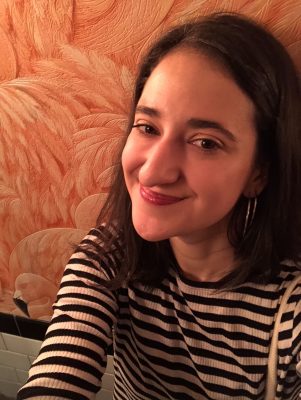Kay Cannon on her Hilarious Directorial Debut Blockers
If you’ve ever been a Teen Movie fan, the last several years haven’t really been for you. While the late 90s and early aughts had more than their fair share of teen movies (many now classics), it’s been few and far between for a studio coming-of-age flick. But in the last month, we’ve been blessed with not one, but two studio teen films: Greg Berlanti’s Love, Simon and Kay Cannon’s Blockers—both that have made progressive new changes to the teen film formula. Ones that don’t include straight white dudes.
While Love, Simon told the coming out story of a teen boy, Blockers makes its focal point three teen girl BFFs who make a virginity loss pact on their prom night. And what could solely be an American Pie reboot (well minus the titular pie), instead is a funny, heartfelt exploration of female friendship, sexuality and family dynamics. But don’t worry, it satisfies all the gross out humor you’d expect from a teen sex comedy of its size—including butt chugging, naked Marco Polo and some of the most hilarious physical comedy in ages.
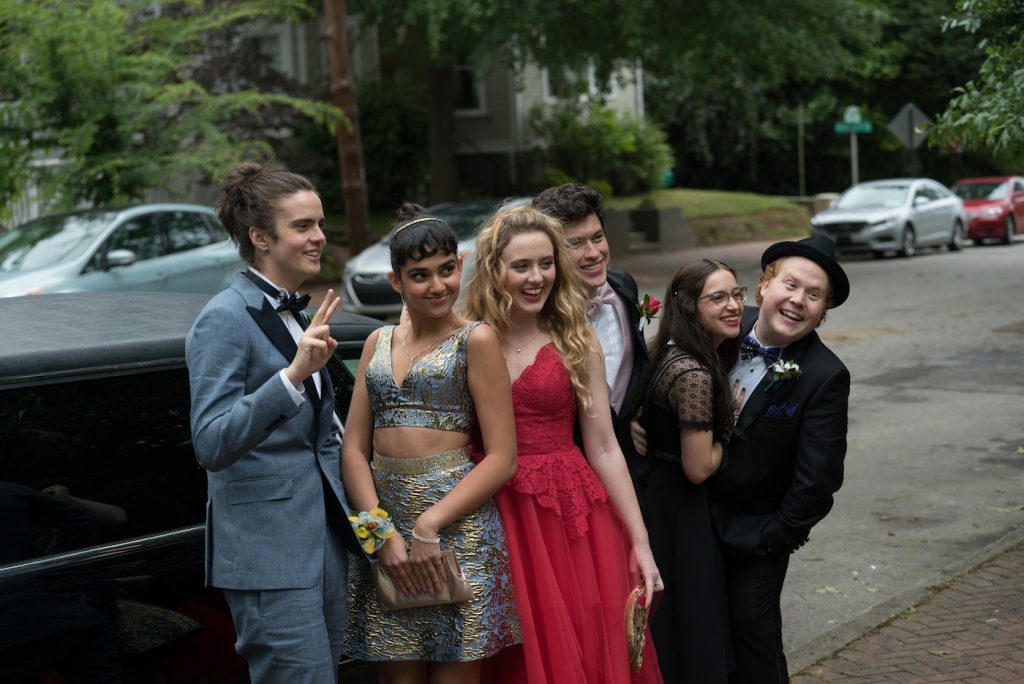
Why Blockers works as well as it does is because of director Kay Cannon. Cannon helped to overhaul the original script by Brian Kehoe & Jim Kehoe and her new director eye, inspired by the realism of John Hughes’ teen worlds, helped to shape the visual direction of the film. After Blockers critically beloved first weekend in theaters, Cannon talked to The Credits on the phone about teen movies, directing her first feature and oddly enough, Vanderpump Rules.
I wanted to know why is this a script that you were initially drawn to, especially since it was your first time directing a film?
Well, I was drawn to it in two different ways. Mostly because I’m a parent of a daughter, and she’s only 4, and she was only 2 when I read the script, but I didn’t care, really, because what the idea behind the movie did for me was make me think about how I would be and how I will be when she is at a time when she’s asking me about stuff. I think I’ll be really progressive, I know I will, I’ll be there however she needs me, but then I also have these moments of dreads, of like, what if she dates Jax from Vanderpump Rules? Because I think he’s a charming idiot, but I would never ever want my daughter to date him, but she will have to figure it out herself, and that’s the struggle, right? That’s kind of the joking struggle. Beyond that, as the mother of a daughter, I want her to love herself, I want her to have confidence, I want her to not go through some bad stuff that us other ladies have gone through. And then I also was a teenager who—don’t tell my mother—but lost my virginity! So I really felt like, this is exciting to get to tell a very underserved story of three girls who are just best friends and just good kids who are funny and awesome, and who are making this pact to do this for their own reasons.
You come from a writing background, was there anything you felt like the script needed or anything you spoke with the writers about changing?
There was a lot. I basically had the luxury, in a way, to take the Kehoe Brothers script, which had already been worked on, so Jim and Brian Kehoe, they had three dads, and when I got the script it was two dads and a mom. There was a lot that I wanted to change. I felt like it was written by men, because it was, and I needed to infuse my perspective, that happened to be female, because we’re talking about women, so there was a lot that I felt we needed to shape and make more clear. And give especially the young women—because it was basically the parent’s movie when I got it, and I wanted to try to balance it out a little bit.
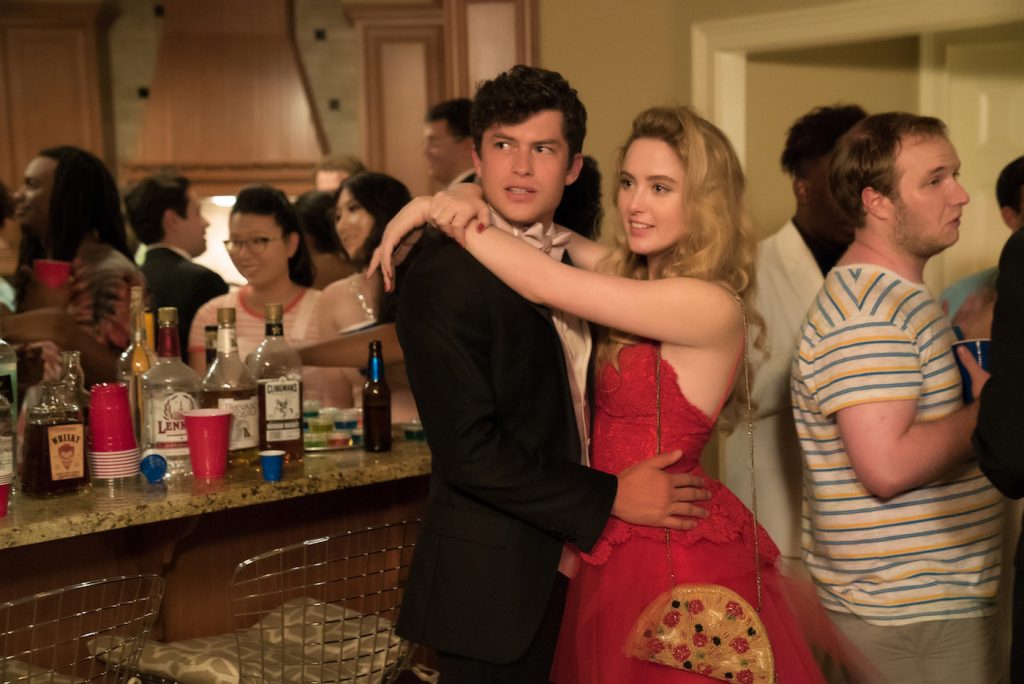
I feel like in a lot of teen-focused films there isn’t a good balance between the parents and the teens. So that was something you worked on evening out?
Yeah, and I really felt like the girls lacked specificity and they felt interchangeable. So, all the storylines of those girls came after I came on board. I think the parents, it was refining their motivations too. This movie lives or dies based on motivation. If the audience is not on board with why the parents want to stop their kids, then they’re like, this is a dumb movie, why am I watching this. And if they’re not on board with knowing that the best friends, why they’re doing what they’re doing, then it’s the same thing. So it was just making sure that everyone had very clear motivations and then making it as funny as possible
Being able to be so involved ironing out the script, did that help make it a good first directing experience for you as opposed to if you were putting someone else’s ideas into your vision?
For sure. I write very visually, so I kind of write from a director’s point of view in a lot of ways. I feel like when I give a script over to a director, I am hoping that I made it so the director doesn’t have to think about it too much, and that’s very specific to television. When it was my show, it’s like, here’s the vision that I want. That applies to this movie, that’s why it felt like a very natural evolution because I am so used to writing visually that I don’t know if I could do it any other way. I don’t know if I could take someone else’s script and not change a word of it. [laughs] Not that I couldn’t do it, I just think it would be really hard for me to do. What I’m really proud of is that the movie that you saw was the movie I wanted to make. That is something that I’m really proud and excited that people are seeing.
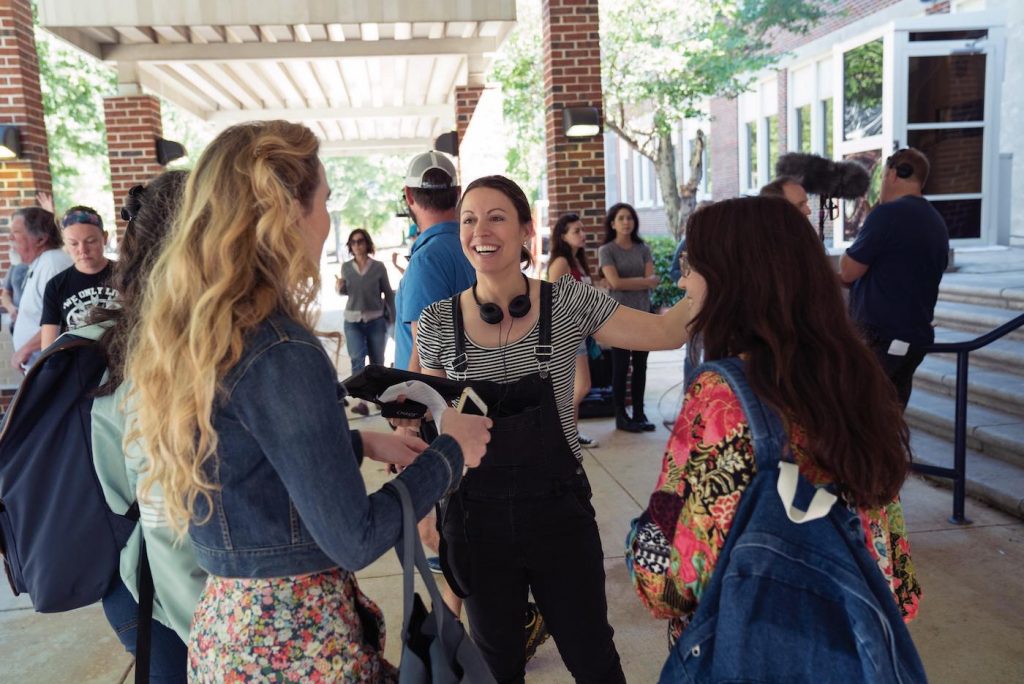
How was this first time directing experience for you?
It was tough because that job of directing is always tough. If it’s not tough, then you’re being a lazy director. But I had just showrunned a show, Girlboss, and to me, that was so much harder. It’s longer, it’s 10 months opposed to 4 months, you know, even with pre-production on a movie, it’s like 6 months.I’m not trying to minimize it because it was my first go-round, I learned so much, but I was used to how hard it would be. I was prepared in that way.
I really saw this a lot as American Pie for women. I was curious, what were some of your favorite teen movies growing up and how those maybe influenced the script and influenced your directing style?
Well, I was not quite a teenager when these movies came out. They very much influenced me, so I don’t want to age myself, but, the four movies that were very influential to me: The Breakfast Club, Weird Science, Pretty in Pink, and Ferris Bueller’s Day Off. Those movies, and I don’t know if you see it when you watch Blockers, but the look of Blockers, I was doing an homage to the look of John Hughes movies. I wanted it to feel real, I wanted to have real Chicago architecture within the homes. I tried to ground it because I knew I was going to go to a crazy place, where myself and John Hughes differ in so many ways. I really enjoy silliness, I definitely enjoy trying to make people laugh really hard, like I get asked, what kind of movie is this!? Is it coming of age, or is it American Pie crazy… whatever! And I’m like, its both. Both can exist within the same movie.
Was there a lot of improvising? You’re working with Ike Barinholtz and Leslie Mann who is a comic genius… were there different parts that were fully improvised in the film?
Nothing was ever fully improvised, but we spent a lot of time having conversations before, in rehearsal and before we shot, like changing up the material, punching it up. Ike was really great about, like, the night before he would be shooting something, he would call me or text me an idea or sometimes we’d FaceTime. I remember washing my face getting ready before going in to shoot, brushing my teeth or whatever, while we’re talking about ideas. He was really respectful of me as a director where he didn’t want to come in and be like, “I’m gonna do this and this and this!” It was a real conversation. He more than anybody could just improvise… the whole inferno run, Disco Inferno. I call that a classic Ike Barinholtz because I think that’s such his thing—he picks something strange and he just goes with it.
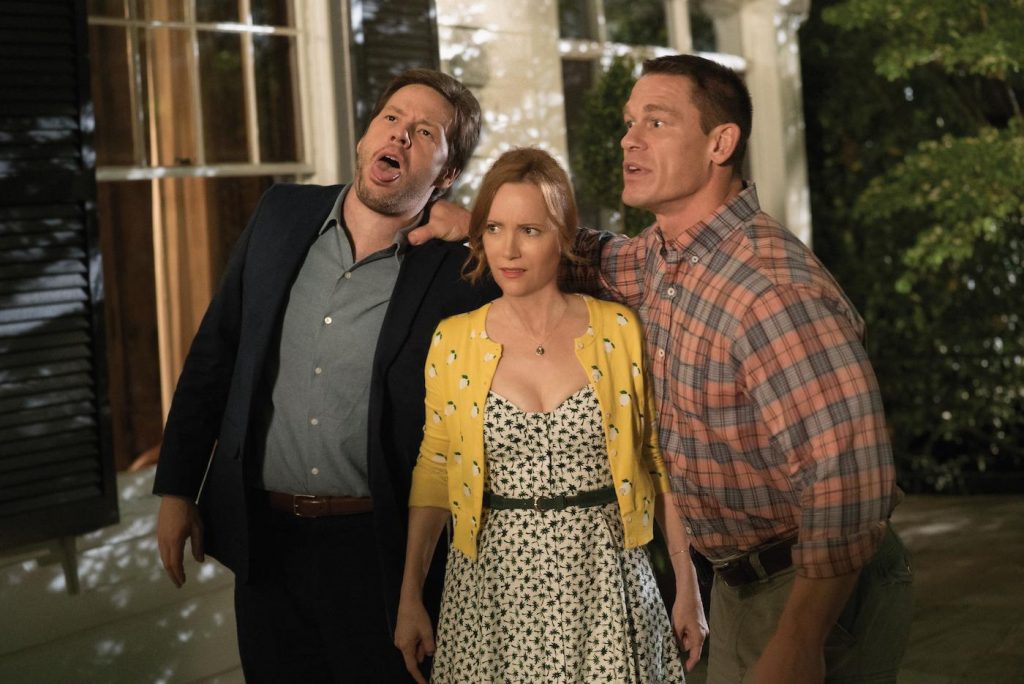
Was the coming out storyline in the original script?
It was not, no, that was something that we added trying to think of what high school girls are really grappling with these days, and again, going back to motivations, like why are they holding back? Why is she doing this pact anyway? Because friendship, she doesn’t want to look like an outsider, so it kind of expanded from there. There was an article that said something like Blockers quietly makes history because it shows this storyline, and I am so happy about that because Universal had no pushback whatsoever. All the other filmmakers, all the other producers, we all wanted the same thing. We wanted to show something different on this very antiquated idea, and explore all the different sides of the double standards when it comes to girls versus guys, and why can’t women have agency of their own bodies and control over… you know, those were all big conversations that we were having the entire time we were making the movie.
I know that this is probably such an annoying question, but how are you hoping that this opens more doors for you directing? It’s so stupid that it’s such a big deal having a woman direct a huge studio sex comedy, but it is, still. So what are you hoping comes from all of this?
I feel like the movie is a win, it got really great reviews and people who go and see it, we’re getting such good word of mouth, it feels really good. In that way, for me personally, I got to show that I directed a movie that worked. That’s gonna help me out when I want to do other things. But what I’m really happy is that the movie works, and that it’s gonna hopefully open up—it should, especially during Time’s Up—it’s gonna show once again that women can direct all different kinds of things and be good business. That will hopefully make the people who are nervous to trust a woman to do different kinds of stories, that they’ll seek other directors who—I got hired based off of potential. I hadn’t directed anything before this. So, I’m hoping that that happens for other women. That would be my dream. I would be so happy if that happened for other ladies.


